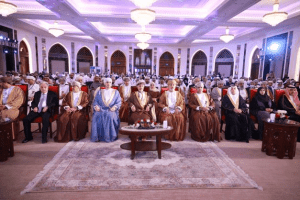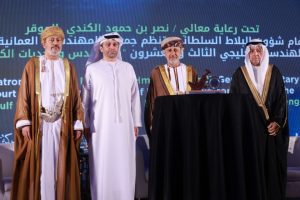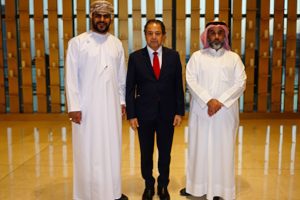Speech of Mr. Mohamed Ali Al Khozaae, Secretary General of the Gulf Engineering Union
H.E. Nasser bin Hamoud Al Kindi,
Deputy of the Ceremony Sponsor His Highness. Mr. Belarob bin Haytham
Your Excellencies
My fellow engineers
Ladies and gentlemen
Greetings
I am pleased to read the message of the Gulf Engineering Forum, organized by Oman Society of Engineers in collaboration with the Gulf Engineering Union under the auspices of His Highness. Mr. Belarob bin Haytham, who has deputized H.E. Nasser bin Hamoud Al Kindi, the Secretary-General of the Royal Court Affairs in the Sultanate of Oman.
In fact, I am reading this message on behalf of all the engineers in the Arabian Gulf, males, and females, represented by all the engineering organizations that are recognized in the GCC countries.
As you are aware, this engineering entity was established in March 1997 in the State of Kuwait when representatives from the GCC engineering institutions met to agree on the formation of a new gathering under the name “Gulf Engineering Forum” which was later renamed “Gulf Engineering Union” during the meeting held in Muscat in 2007. A number of specialized professional committees were formed in each Gulf country to study means of cooperation in the field of engineering and develop the process of working among people of a similar profession in addition to organizing a Gulf engineering forum every year in the GCC countries in alphabetic order.
Ladies and Gentlemen
Dear colleagues
This morning you witness the 23rd Gulf Engineering Forum which is organized by Oman Society of Engineers in collaboration with the Gulf Engineering Union under the theme “Engineer and Disasters Challenges”. This topic covers one of the major issues that require engineers to play a substantial role and active contribution by the engineers to avoid the impacts of disaster and study the means of developing capabilities by benefiting from the experiences of other countries through reliance on the latest technologies. Despite our contention that it is impossible to avoid natural disasters but through study, development of research, and accumulation of expertise we will be surely able to minimize its negative impacts. This could be achieved through early warning and incorporation of risk assessments with the early warnings and protection measures and benefiting from the experiences of other countries by using the latest mechanisms and technologies.
There is nothing better than benefiting from the experience of our Omani fellow engineers whom they passed through lots of experiences like Cyclone Gono that hit the seashores of Oman on 3rd June 2007 and reached its extreme rotation speed of 260 kilometers per hour. However, the Sultanate of Oman managed to recover from its impacts and learned a lot of economical and social lessons from it. Despite the material losses that Oman has suffered, it has managed to protect people and property due to its expertise and reliance on local capabilities. Therefore, the need is more urgent than ever to exert efforts to put forward a strategic disaster plan through a group of arrangements, organizations, and preparations to be agreed upon to deal with disasters before they occur, during their occurrence, and thereafter. Disaster strategic planning may be applied to establishments, organizations, and communities and on the national level as well.
Finally, I would like to express my thanks and gratitude to our sponsor His Highness. Mr. Belarob bin Haytham who has honored us with his presence and to the members of Oman Society of Engineers for their hospitability and high organizing quality of this event, particularly the use of professional scientific papers, and I hope that you will fully benefit from the research that is submitted and to utilize this unique engineering gathering for the exchange of knowledge and information.





